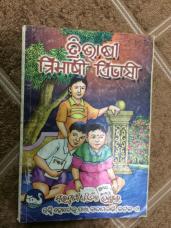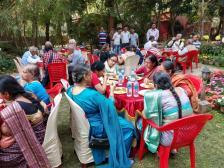
This Women’s Day, let’s celebrate the lives of some of our exceptional women members, who have dared to break the shackles of convention and managed to create a niche of their own.
<...
This Women’s Day, let’s celebrate the lives of some of our exceptional women members, who have dared to break the shackles of convention and managed to create a niche of their own.
Education
Ms Sandhya De shares her journey — from aspiring to do something for the society to hindrances from various sources and then establishing it as a powerful organisation — with Mousumi Gupta.
During her stay in Kharagpur as the spouse of an IIT faculty, Support Elders member Mrs Sandhya De, along with a few like-minded people, started a charitable organisation for the families of sweepers and office assistants working in IIT-KGP.
Everyday, the women, including Mrs De, sat down for a round of carefree adda (chit-chat) once their husbands and children left home. During these sessions, the women hit upon the idea to give something back to the society with belief in the adage “charity begins at home
“So, we decided to pitch in with our savings and visit the housing quarters of domestic helps and Grade IV staff, most of whom were Tamil-speaking. The aim was to uplift the underprivileged through educating their children."
“Convincing most weaker section families, where the breadwinners were alcoholics, about the importance of education and sending their children to school was a Herculean task,’ recalled Mrs De. “So, when we started visiting their quarters, the otherwise polite men, who used to work for us, hurled abuses at us. Sometimes the women would gesture us to leave in fear of their husbands who were at home.”
It was not an easy journey for the group. “But it was our sheer determination that we could succeed in bringing some children out of that environment and could fulfil their fundamental right to education.”
“But the clothes and books we gave the children were either torn into pieces or burnt by their fathers. After the mothers were convinced, it became somewhat easier for us to involve more and more children. The small room from where the school started gradually shifted to a larger accommodation, thanks to the local priest who willingly gave us a big room behind the temple,” reminisced Mrs De.
“Once our first aim gave us some hope, we started to think about training women in productive activities, which could augment the family income. The activities included guidance in sewing, stitching, making handicraft and supporting them to sell their products. Within a short time, they started getting interested and became more and more involved.”
“Then, unfortunately, the hindrance came from unexpected quarters. Some of the families of the IIT faculty got upset with us, because their domestic helps grew more interested in stitching than doing household work,” said Mrs De.
“Collection of funds was also a problem. Other than private donations, we had to collect money from local shops or business groups, which was not at all easy for us. But after all the hard work, when we could see some of our students opting for higher studies, it gave us a tremendous sense of pride and satisfaction,” said Mrs De, with a smile.
Pic credit: https://www.maxpixel.net/Composition-Congratulation-March-8-Flowers-Symbol-2082120
Want to share your experience? Please mail your story to writetous@supportelders.com with your name

One of our members, Mr Dilip Kumar Dutt, has set an example of how spreading the light of knowledge cannot be bound by the barriers of age and language.
How ...
One of our members, Mr Dilip Kumar Dutt, has set an example of how spreading the light of knowledge cannot be bound by the barriers of age and language.
How far can a person’s conviction take him? Quite far!
Meet Dilip Kumar Dutt, a demure octogenarian and a retired engineer. Scratch the surface and out comes the gentleman’s resolve to teach and raise the two sons of the Odia caretaker of his residential house in Salt Lake, Kolkata.
The once-upon-a-time Bengal divisional cricket player, Mr Dutt, who has been playing guide and mentor to the two boys soon after their parents moved into the Dutt house more than a decade back. Not one to accept language as a barrier, Mr Dutt helped admit the two brothers into an Odia-medium school in Ultadanga for studies. And, the then septuagenarian started learning Odia himself. Right from learning the alphabets from the Odia primer and numericals to picking up the skills of spoken Odia, all Mr Dutt aimed was to guide the brothers ably in the right direction.
Mr Dutt initially insisted that the Odia couple put their children in a Bengali-medium school so that he could guide them easily. But they were more interested in the Odia school. Finally, Mr Dutt relented, thinking that the children would get educated unlike their parents.
But the brothers started struggling once promoted to higher classes. With almost no help from the school, they needed guidance in their studies. Mr Dutt thought of teaching mathematics, which would not trouble him with the language. But some of the sums needed explanation. With no other alternative, Mr Dutt went back to several bookstores in the hunt of Odia to Bengali/English dictionaries. He not only bought translation of mathematics but also ended up buying almost all the books where the stories were translated into Bengali. He studied the language in depth to explain the subjects properly to the boys.
When the elder boy passed Class X, Mr Dutt gathered information about an automobile course in the George Telegraph Training Institute and thought of paying its fees for the boy’s studies. But he decided to take up Plus Two in commerce in which Mr Dutt is guiding him now.
Mr Dutt’s sheer perseverance of showing the younger generation the light of knowledge by learning a totally unknown language in his silver years is inspirational, to say the least.
Want to share your experience? Please mail your story to writetous@supportelders.com with your name

One of our members, Mr Sujoy Kumar Roy, shares his experience of spending a fun-filled spring picnic at a farmhouse on the southern fringes of Kolkata.
The rendezvous at a ...
One of our members, Mr Sujoy Kumar Roy, shares his experience of spending a fun-filled spring picnic at a farmhouse on the southern fringes of Kolkata.
The rendezvous at a Harinavi farmhouse in February augured well for the year 2019. It was spot on with a burst of season flowers in colours aplenty on the lawns of a bungalow, where Support Elders members had assembled. The atmosphere was la dolce vita! The breakfast was spoiling good. Bon Appetit!
The lunch came around several hours hence. I approached the plate charitably as never before on yummy dishes, and the fried things came so pat in the mouth, oh dear! Ladies and gentlemen were quite at home not ready to be sniffed away as defunct roses of yesterday. There was a sing-a-song atmosphere serenading in the air on a support guitar. Laugh parties and honest deceits beguiled everybody. Thus, we whiled away the afternoon hours. Why tomorrow, I may be with yesterday's seven thousand years! The weight of years seemed lightened. No rustiness of age today. I felt like singing "Que sera, sera, whatever will be will be, the future is not ours to see.”
I packed off when the famous harmony of leaves was rustling in the trees. Back at home, I slept in a happy good night air, the leafy oratories still in my memory.”
Want to share your experience? Please mail your story to writetous@supportelders.com with your name

By Mousumi Gupta
This Women’s Day we are celebrating our member, Mrs Alta Ahmed, and her empathetic contribution to people around her.
&...
By Mousumi Gupta
This Women’s Day we are celebrating our member, Mrs Alta Ahmed, and her empathetic contribution to people around her.
Mrs Alta Ahmed is an exceptional woman with an empathising attitude and an eagerness to help the people around her. She was with her husband Mr Kaisar Ahmed in Hong Kong in the early 70s. Since her husband was quite busy with his official assignments and tours, she thought of doing something charitable to keep herself engaged. She joined “The Samaritans” as a volunteer, in Hong Kong. This is a non-profit, non-religious organisation giving confidential emotional support to people who felt at bay in an alien country and culture. Hong Kong was still under British rule at that time, so many British families used to come and stay there. The women often felt lonely and depressed because of the cultural and environmental shock. It was the responsibility of a ‘Samaritan’ volunteer to listen to their needs and give them a feeling of companionship. The opportunity to talk about what they went through and how they felt listener helped them to deal with their problems. Mrs Ahmed helped many such people by giving them her time and attention and acknowledging and respecting their feelings.
After her husband got transferred to the US, she again started searching for a similar kind of engagement, as it had given her immense satisfaction. It was then that she came in contact with an organisation which educated prisoners to enable them to get a job and be a part of mainstream society once they were out of prison. She joined there as a volunteer teacher to the female inmates.
Mrs Ahmed reminisces, “I still remember my first visit to the prison...after handing over all my belongings to the prison guard I entered through the first gate and the gate dropped down with a huge bang. There was only one gate between me and the prisoners then, with some of them being there for something as terrible as murder. But in my very first meeting all my fear dissipated, when I saw how eager and hopeful they were to meet their new teacher—who would help them to learn something and make a life on the other side of the wall.” Twice she brought some of the girls to her house for lunch, with permission from the jail authorities. She said, “I was extremely happy to see how the girls enjoyed a normal family life. My husband helped one of them to get a job and she is happily settled in her life thereafter.”
In Mrs Ahmed’s words “Often people commit crimes because of some unavoidable circumstances, but that doesn’t mean that their right to lead a normal life should be snatched away from them.”
We want to observe this Women’s Day with all the women who have transformed the lives of other women so selflessly.
Pic credit: www.pixabay.com/en/women-s-day-international-women-s-day-3/MAKY_OREL
Want to share your experience? Please mail your story to writetous@supportelders.com with your name

Our member, Mrs Mira Pal, tells us about her fond memories of Shivratri at her childhood home Majdiya in Krishnaganj of Nadia district. The Siva Lingam there is the tallest one in eastern India.
Our member, Mrs Mira Pal, tells us about her fond memories of Shivratri at her childhood home Majdiya in Krishnaganj of Nadia district. The Siva Lingam there is the tallest one in eastern India.
Shiva Niwas, a tiny hamlet in Krishnaganj in Nadia, has a beautiful history related to it. Anticipating an attack from the Bargis and Maratha raiders, Raja Krishna Chandra Rai temporarily shifted his capital from Krishnanagar to this place. The Raj Rajeswar Temple, named after Lord Shiva, was built by him in 1754. There is a 300-year-old “Shiva Lingam” here. Of the 108 Shiva temples built by King Krishna Chandra, only 3 of them still exist, the rest have been swallowed up by the mighty Ichhamati river. There is a shrine of Ram and Sita beside it. The design is a curious blend of the Hindu, the Islamic and the Gothic styles of architecture.
Shivaratri is celebrated on the new moon day in the month of Maagha according to the Hindu calendar. “I remember waking up early in the morning, often while it was still dark outside…” she recounted, “I used to celebrate Shivaratri with great devotion and religious fervour. After having tea before sunrise, we used to fast the whole day. We didn’t even drink water. In the evening, we visited the temple to anoint the idol of Shiva with milk, water and honey. During that time there wasn’t any market or shops where we could buy the “akondo” flowers, which are an integral part of this puja. We used to carry the traditional puja items like milk, water, bel leaves, fruits, incense stick, oil lamp and flowers from home. But the problem for us was that the lingam was so tall that we couldn’t smear milk and water at the top, instead we used to pour that on the base!! A few villagers used to bring handmade clay dolls for sale near the temple. This was a major attraction for all of us and we were very happy to buy those things from them. My sisters used to have fruit after coming back home, but my mother and I would eat something only after “Chaturdashi” was over. Even now I try to do the puja almost the same way as I did before but I miss my childhood Shiva Niwas temple. I have heard that due to massive popularity of the festival, several stalls selling puja items have come up outside the temple. The area has now been renovated by the Birlas and they have made stairs so that the devotees can climb up and smear the milk and honey at the top.
How to get there?
Majdiya is now well connected by rail and road. There are trains from Sealdah to Majdiya, and auto service from Majdiya to Shiva Niwas. It takes around 2 and half hours to reach Majhdiya. One can easily go there and come back in a day, but if someone wants to stay, the nearest hotels are in Krishnanagar.
Want to share your experience? Please mail your story to writetous@supportelders.com with your name

